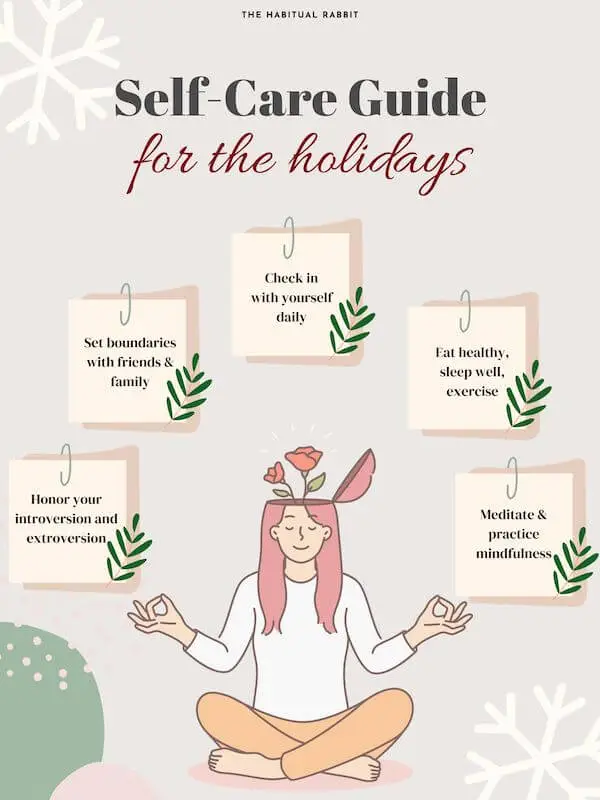
Like many others out there, the winter holiday season is my favorite time of the year. There’s just something about the airiness and warmth that fills our surroundings and brings a new level of excitement and chaos into our lives.
And really good marketing strategies, that’s mostly what it is.
Despite that, holidays are meant to be a joyful time – a time of relaxation and rejuvenation, spending quality time with loved ones, and making meaningful connections. Think of all those classic holiday movies: Love Actually, The Holiday, Home Alone, and my favorite, Elf.
Yet, reality doesn’t always align with the expectations. And for plenty of people out there, the holidays can be a daunting and stressful time. It can be a lonely time.
It can even feel like that Christmas episode from The Bear (my new favorite show of all time). In this clip, a tense and heated family gathering turns chaotic as tempers flare and forks are thrown.
Disclaimer: it contains NSFW language…and it gets super tense
Whether you’ve got a big family, a small family, a chosen family, or just friends, or maybe it’s just you, stress is a common feeling that lurks in the darkness until that big trigger comes around – the holiday season. We’ll guide you through the stressors of this busy time with tips on how to better manage your mental health during the holidays.
Table of Contents
Self-Care Guide for the Holidays

Common Holiday Stressors
During this time, the most common holiday stressors are:
Finances
There is an exponential amount of spending during the holiday season, and for this reason, many people increase their credit card debt, which leads to more financial stress later on. I know exactly how this feels. Trust me, I’ve been there too many times.
There’s always this mounting pressure around gift-giving, thanks to the commercialization of the holidays. This financial stress puts a strain on our immediate situation, and worse, it’s a headache when we get to the year-end accounting and are confronted with our overspending and accumulating debt. All in the name of the season of giving.
In our upcoming post, we’ll be discussing financial health during the holidays and alternatives to traditional gift-giving. Be sure to check it out!
Holiday shopping
Shopping can be a stressful experience for some. But holiday shopping? Well, that amplifies stress by 1,000%. Then couple this with the financial stress. You’ve got yourself a recipe for a meltdown.
Crowded shopping malls and stores, bumping into other people, everyone looking at the same item, ridiculously long lines, cashiers who are struggling… need I go on? Just writing this is stressing me out!
Family
This is a tough one, especially for millennials like myself who are unmarried with no children. If you come from a traditional Asian family, then you know what I’m about to say.
“When are you settling down?”
“Why aren’t you married yet?”
“[insert name] is getting married, when is it gonna be your turn?”
“You need to start thinking about kids soon!”
“[insert name] is having another baby!”
“You’re getting old!”
Aside from all the questions, perhaps there are just some relatives you don’t vibe with and would prefer not to be around. But here we are, engaging in small talk. And next thing you know, they’re saying the thing or doing the thing that’s about to trigger a response.
Disrupted routines
While the holiday can be a nice break from work or the boring day-to-day, there is a level of stress that comes from disrupted routines. First, our body gets out of wack because there is a sudden change in routine. This disruption can cause some level of stress, depending on how often your routines are changed.
Planning for travel and the actual traveling
If you’ve ever traveled during the holidays, then you know exactly how stressful and chaotic the whole process is. From the planning process to the actual traveling itself, the whole idea of traveling during the holidays is just a different kind of beast. And if you’re traveling with little ones? That’s another layer of stress to the planning and traveling itself.
Weather and climate
Depending on your geographical location, the weather and climate can also impact your mood (seasonal affective disorder); whether it’s the shortened daylight hours (getting dark at 4 PM in Toronto), colder climate, or lack of sunlight.
The best thing you can do for your stress and anxiety is to acknowledge it; give it the attention, recognition, and respect that it deserves. Don’t pretend it doesn’t exist.
I know it’s easy to just brush it off as you’re rushing through the chaos of the holidays. I’ve done that so many times so that I can get through my to-do list.
Then BAM! Whatever it was that I dismissed previously is right there in my face at the most inappropriate time. The more you do the latter, the louder your stress and anxiety will scream to you, “Witness me!” (for all the Mad Max: Fury Road fans out there).
If you don’t deal with it, it’ll come back at the worst time.

Self-Care Guide for the Holidays
Just like your shopping list of holiday gifts, which is essentially a guide on how you’re making people happy…through gifts, you need a list of how to take care of yourself so that you don’t burn out!
And guess what, we’ve got you covered with that list.
Check in with yourself daily
Quality time alone can be a great way to destress, recharge, and improve your mental health – whether it’s through journaling, a hobby, or watching a movie or show. Each day, gauge your internal stress level from 1 to 10; when you reach a certain point, that’s when you know you need to take a break and disconnect, especially if you’re constantly around family during this time.
Recognize what your triggers are to help you prepare for stressful situations. What is making you feel physically and mentally agitated? Is shopping for holiday gifts too stressful for you? Or having to socialize with many people you aren’t close with? Once you know your stressors, you can take steps to cope with them. This is why it’s so important to have this alone time; you need time to be with yourself in order to understand yourself.
Here is a simple reflection exercise – ask yourself:
- What’s something you want to add to your life for next year? (For example: add reading into my nighttime routine to help me destress and sleep better)
- What’s something you want to subtract? (For example: quit stress eating)
- What’s something that has brought a positive impact on you and you want to double down on? (For example: doing yoga on Sunday mornings)
Eat healthy, sleep well, exercise
The holidays are also a time of overindulging – drinking alcohol, overeating, eating more sweets than you normally would. This just makes you feel more emotionally unwell and exhausted, which will compound your stress and anxiety.
Then, all the stress and anxiety coupled with food and alcohol will contribute to poor quality sleep or lack of sleep altogether. And now you’re really in a funk.
Here is Kevin’s personal experience:
This was back when I didn’t see the value of daily routines. Whenever I’d come under heavy stress, or whenever my sleep quality gets impaired, I would wake up feeling stressed, which leads me to stop working out and stop caring about what I eat and how much I eat… and the negative cycle just reinforces itself. After all, a time of stress is the easiest time for us to fall off our routine.
Maybe you’re telling yourself “It’s a special occasion, I’ll get back on the routine later.” But this mindset sets you up for a very difficult mountain to climb. Even through the holidays, try to maintain some sort of routine.
Add healthy meals or snacks between group dinners, parties, and gatherings. Take vitamin C, or multivitamins to protect your body during a potentially chaotic period. Maintaining a regular sleep schedule is so important, as it allows you to recharge and help your body function optimally. Finally, exercise will release dopamine and make you feel good while burning off all those calories from alcohol, fatty foods, and sweets.
Yes, I know that we say this a lot and we will keep telling you just how important eating well, sleeping well, and exercising are. Sometimes, the simplest answers are the best solutions.

Meditate and practice mindfulness
With the chaos of family gatherings and the added stress of all that needs to be tended to during this time, it’s extremely important to practice mindfulness. This is often the time that you least want to do it, but just like eating well, sleeping well, and exercising, this is the time that you need it most.
Some great techniques that both Kevin and I love to use are deep breathing exercises (super easy to do), yoga, walks, and meditation (whatever that looks like for you).
There are many deep breathing techniques you can try. Again, test them out and see what works best for you. There’s no right or wrong way to do this!
Kevin has tried at least 5+ different techniques, but this is the one that works best for him. It’s quick and simple, easy to remember, and it can be done anywhere.
To learn more about strategies for mindfulness, read our blog post.
Honor your introversion and extroversion
Introverts and extroverts handle social interactions very differently. Take Kevin and I – total opposites, where he is more introverted and I’m a true extrovert. We both navigate social situations in our own ways and ultimately, we do what’s best for our own mental wellbeing.
You have to know which one you are and accept who you are so that you can put yourself in the most optimal environments and situations. Remember that going against who you are is actually you working against yourself, which will negatively impact your mental health in the long run.
Another snippet from Kevin’s personal experience:
Back when I refused to acknowledge my introversion, I would literally force myself to fit into an extroverted world, which would only make me more drained. After accepting myself for who I am, I know that I only need a few quality interactions with close friends – in small groups or 1-on-1 to feel socially nourished. By embracing myself, the quality of my social interactions has gotten significantly better and more meaningful.
Regardless if you’re introverted or extroverted, you need to make sure you create time for yourself. This connects back to those daily check-ins and mindfulness practices. I’m super guilty of not doing this and honestly, it’s still something I’m working on!
Set boundaries
This can mean a variety of things, but the most important thing to keep in mind while setting boundaries is that you are putting YOU first.
Setting boundaries with friends
In terms of events, parties, and gatherings, it may feel like an obligation to have to attend every event, especially if it’s with family and close friends. I get it, we often feel pressure to have to say yes to every holiday party.
For example – you receive an invite to your friend’s party. You say yes initially because you’d feel bad if you said no. Essentially, you kick the stress can down the road. You spend the next few days feeling tormented about your decision. Then the day finally comes, and you either guilt trip yourself to go or you say you can’t go, feel bad, and end up overcompensating.
Remember – you are allowed to say no. After all, this is the holiday season, and the holidays are a time for you to do what you want, not what you have to do or what you should do; there are no obligations here.
Setting boundaries with family
Another set of boundaries to consider is when spending time with family. Typically during this time, older relatives will start prying into your personal life and their questions can feel interrogative. It can be very uncomfortable and triggering!
Yes, Asian families, I’m talking about you!
Be realistic and expect to be triggered, as there always tends to be some tension within the family. It could be a mention of your weight, appearance, lack of a significant other, or literally anything else they can pick apart. There are so many ways family members can trigger you; know exactly which people will trigger you and how so that you can avoid it.
Take some time to think ahead about how you will respond in these situations. Planning ahead will help you manage your expectations, prepare for triggers in advance, and help you be present when the moment comes. It’s more work, but trust me, having a game plan and steps you can take if you begin to feel uncomfortable will go a long way.
Final Thoughts
The holidays are a time of giving, but oftentimes, we invest all our efforts into giving to others while neglecting ourselves. It’s important to be aware and mindful of the stressors that come with the holiday season. It’s not always a joyful and peaceful time for many people. While the holidays are meant to be a festive time, it can just as much be a time of grief and trauma – for example, for those who recently lost a loved one, the holiday season can intensify that pain.
Observe and take care of your mental health while you navigate these waters. By doing so, you may also be helping out someone else who’s struggling. We hope these strategies are insightful and that you’ll be able to implement them this holiday season. No matter where you are, who you’re with, and what this holiday means to you, we hope you are happy.

